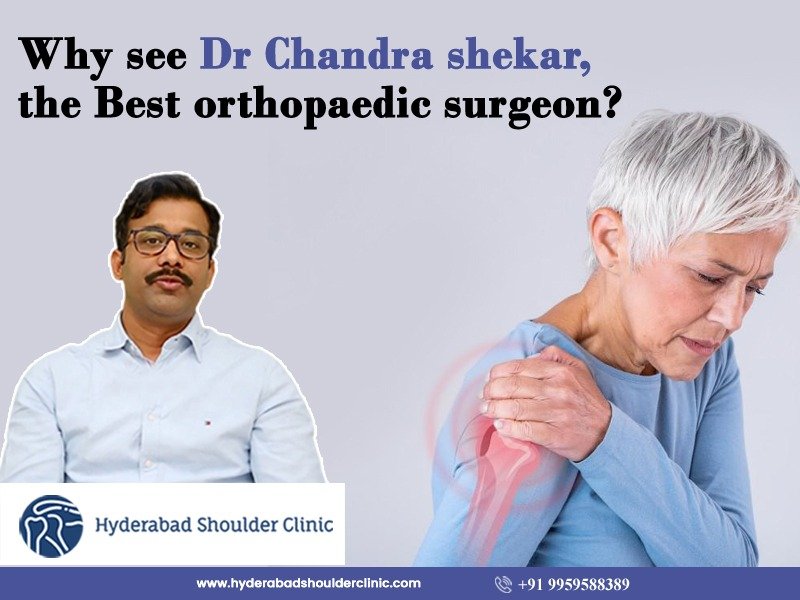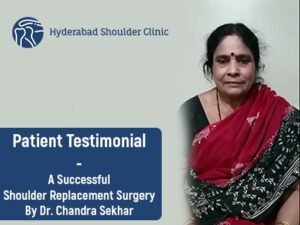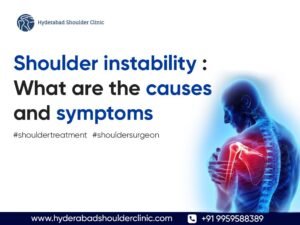Do you have long-term pain in your tendons, muscles or joints? Do you have chronic shoulder problems? There are more than 28 million Indians who develop some musculoskeletal problem each year.
Orthopedists specialize in problems, diseases, and injuries of the musculoskeletal system. Orthopedists play an essential role in the diagnosis, treatment, prevention and rehabilitation of the musculoskeletal system. Orthopaedic surgeons work in hospitals and have clinics that deal with sports injuries, infections, fractures, joint problems, congenital diseases, degenerative diseases and bone tumours. They treat everything from minor issues like ankle sprains to complex procedures and surgeries such as hip replacements.
The article below is intended to be the most common reasons for someone to be seen by a shoulder specialist Dr Chandra Shekar. B.
What do orthopaedic surgeons do?
Orthopaedic surgeons use surgery as a last resort to treat musculoskeletal problems. They try to delay this as long as possible in favour of less invasive treatments such as medication and physical therapy. If these treatments no longer relieve pain and other symptoms, they may recommend surgery. Some of the most common operations performed by orthopaedic surgeons include back and ankle, knee, shoulder, and hip surgeries. They also perform various arthroscopic procedures that they can use to visualize, diagnose, and treat problems with the joints.
The sooner you seek advice about musculoskeletal problems, the sooner you can start treating them. If it has an early treatment, the situation gets prevented from getting worse. During the initial consultation with the orthopaedic surgeon, they will isolate the problem, isolate the problem’s cause, and explain treatment options. You can also seek advice on pain management, including medication and injections, rehabilitation, and physical therapy, including a possible time frame, and on an ongoing basis.

When should I see Dr Chandra Shekar, the Best orthopaedic surgeon?
If you have trouble using any part of your body because of pain or stiffness, or if you have soft tissue (muscle, tendon or ligament) injury that doesn’t improve, your orthopaedic surgeon can help you heal. With this type of doctor, you will feel better and move more efficiently, as quickly as possible, without unnecessary testing or extra waiting.
Orthopaedic treatment can be as simple as physical therapy or as complex as hip or knee replacements. Many orthopaedic surgeons work in group practice and thus have many orthopaedic surgeons who specialize in treating specific bodies.
One of the advantages of orthopaedic group practice is the presence of a physiotherapist and nurse. The orthopaedic surgeon will work in a team with other physiotherapists and providers to make the patient more pain-free and flexible.
Reasons to see Dr Chandra Shekar, Best shoulder surgeon?
- If you have any common causes of shoulder pain: The shoulders allow you to move your arms sideways, back and forth, and over your head. Repeated movements or sudden sharp injuries can cause painful shoulder injuries. Chronic conditions such as arthritis can also damage joints.
- The rotator cuff is torn: The four muscles in the upper arm connect the tendons and form the rotator cuff, which – as the name suggests – allows you to rotate the arm. This tendon can tear with sufficient force, causing the rotator cuff to tear.
- Fracture: A broken shoulder can occur if you fall over the shoulder or hit the shoulder with great force. The ties that hold your shoulders to the collar are stretched or torn.
- Frozen shoulders: Your shoulders can become so stiff that you can no longer lift or pull your arms away from your body. A frozen shoulder can appear if there is a scar in the capsule or occur without any reason.
- Dislocation: A shoulder dislocation is different from a split shoulder. A decisive blow to the shoulder can push the ball of the humerus out of the humeral fossa. The dislocation can be partial or complete.

- Tendonitis: Repetitive movements can cause irritation and inflammation of the tendons.
- Sprains: Falls, especially if you land with your arms outstretched, can stretch or tear the ligaments holding the joints, causing dislocated shoulders.
- Strains: Tense shoulder muscles are caused by overuse or a sudden increase in use.
- Arthritis: The most common arthritis affecting the shoulder is osteoarthritis.
- Bursitis: Bursitis occurs when the small, fluid-filled sac that prevents your bone from rubbing against another part of your shoulder becomes inflamed and painful.
- You have trouble sleeping, especially on the affected shoulder: A tear in the rotator cuff tendon can cause pain at night that can interfere with your sleep. During the day, the pain is usually more bearable and only aches with specific movements. Tendonitis can also cause pain at night, mainly if it is located on the affected shoulder. Other symptoms of both conditions include weakness and loss of motion when lifting your arms above your head, stiffness when lifting or moving, and difficulty putting your arms behind your back.
- It is challenging to raise your hands above your head or reach back: If you have pain when combing your hair or tucking a shirt for several weeks or longer, it can be due to a cuff tear, a labral tear, or some other type of structural damage. Usually, these injuries won’t get better without treatment and can become more severe and difficult to heal over time.
- Your shoulders snap or catch: Terms like “snap” and “catch” can mean different things to different people. Therefore, it can be challenging to diagnose orthopaedic conditions based on this type of explanation. But terms like “click”, “snaping”, “pop”, and “catch” are standard methods people use to describe what turns out to be a labral tear. Often, this symptom appears when doing activities such as lifting weights, push-ups, or sports that involve throwing a motion.
- It hurts so much to reach through your body: I often hear these complaints from weight lifters, crash athletes, and manual workers. This type of pain can be caused by osteolysis of the distal collarbone or osteoarthritis of the acromioclavicular (AC) joint. After a traumatic injury, it can also be an AC joint injury.
- Your shoulders / upper arms look abnormal: If you have an obvious deformity such as a protruding collarbone, a lump in the upper shoulder, or a bent appearance on the upper arm, you may have a fracture or joint injury. This injury usually occurs when a person falls on the shoulder or receives a direct hit.

- If Homecare didn’t help: After you’ve given enough time for your shoulder to repair itself, including rest, anti-inflammatory drugs, and changes in activity and symptoms, it’s a good idea to see a specialist like Dr Chandra Shekar, the Best shoulder surgeon. Many of my patients say they want to visit me earlier because they feel unnecessary pain.
Also,
Meet your shoulder surgeon if:
- The pain does not subside even though the shoulder is relaxed and away from activities that cause pain.
- The pain is there even when you don’t use your hand.
- Pain accompanied by tingling in the hands, weakness, or paralysis.
- For example, the type or intensity of pain varies from pain to acute pain.
- The pain returns when you resume activities such as reaching or lifting something heavy.
- There is a new lump or lump near or on the shoulder.
Shoulder pain can affect many things in your life, from work to play to sleep. It’s essential to check your shoulder if the pain doesn’t go away. With some injuries, such as, for example, frozen shoulders, the longer you wait for medical help, the more difficult it is to treat the problem. If you experience shoulder pain or swelling, that doesn’t go away, talk to your doctor about your diagnostic and treatment options.
If any of these symptoms describe what you’re experiencing, it’s a good idea to make an appointment with Dr Chandra Shekar, the Best orthopaedic surgeon. The sooner you seek advice about your problem, the sooner you can start treatment and return to a busy, painless lifestyle.
Conclusion:
If you have a shoulder injury and cannot treat it, see Dr Chandra Shekar, the Best orthopaedic surgeon, a qualified orthopaedic surgeon, for in-depth assessment and immediate treatment. Our team at the Hyderabad Shoulder Clinic consists of orthopaedic surgeons, practice nurses, assistants, and physical therapists who work together to develop a holistic approach that suits you best.
If you are in Hyderabad or anywhere in the Telangana and Andhra area and have problems with bones, joints or muscles, call us today to schedule a consultation. Call us at 099595 88389 or make an appointment online. We hope to help you return to your everyday life.
Hyderabad Shoulder Clinic orthopaedic surgeons use the latest technology and extensive experience to accurately diagnose your problem and develop the best treatment plan for you. If you have injured your shoulder or elbow, make an appointment with Dr Chandra Shekar. For more information, please visit https://www.hyderabadshoulderclinic.com/.





